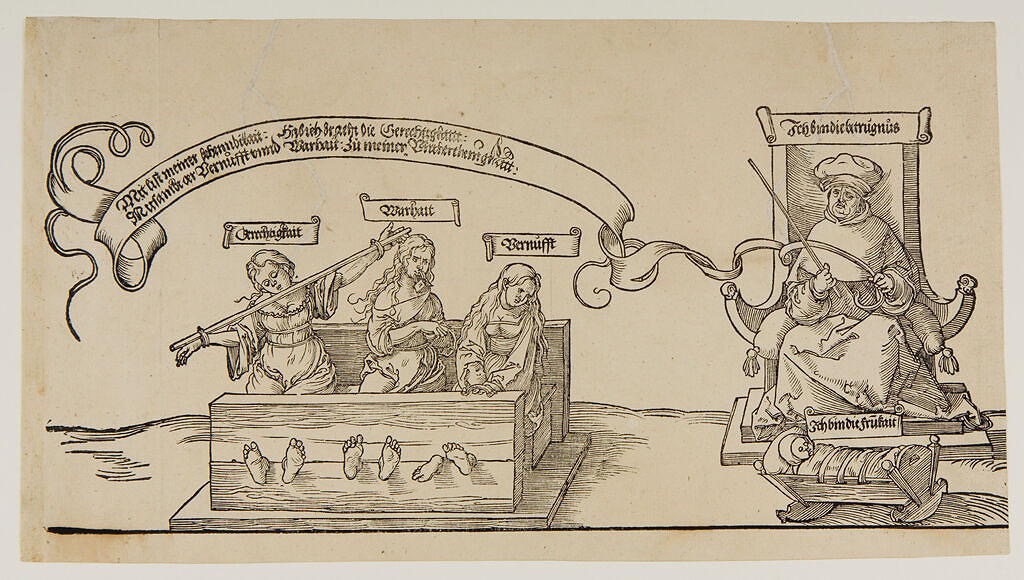FalseBelief

Albrecht Dürer: Justice, Truth, and the Future
in the Stocks before the False Judge (1526)
"These performances exhaust everyone involved."
Nobody can successfully argue that democracy isn't inefficient, but then those who argue for efficient government might misunderstand government's deeper purpose. What should justice cost? What overhead does injustice inexorably extract? Should we simply avoid engaging as a society in inherently inefficient activities that do not properly scale, like education and medicine? Should we always expect some return on our investments in governance, or are some sunk expenses, table stakes extracted as the inescapable price of engaging in governing at all?
My forebears here in the Valley They Liked So Well They Named It Twice built a grand county courthouse back near the beginning of the prior century. They raised their own taxes to accomplish this and accepted private donations from grateful immigrants. It still stands there, being remodeled and updated at considerable cost today. When we needed to expand a few of the county offices, a bankrupt bank's building was purchased rather than raise taxes to build another edifice for the ages. Which building better represents a deep respect for the institution, the wedding cake building or the more modern one? Which one might elicit pride as you enter to conduct your business, and which might evoke the sense that you're engaging in a commercial transaction rather than an essential social interaction? There are good reasons why churches traditionally build inspiring edifices for the ages.
And what of the heretics, those who cannot seem to get with the program? For the authoritarian, the heretic presents a special sort of dilemma. A leader can demand fealty but not belief, for demanded belief seems different. One can go through the motions without convincing anyone, especially themself, that they represent a true believer, and authoritarians demand, above and before all else, true belief. Loyalty tests might ensue should any questionable behavior show through, and try as one might, nobody can successfully pantomime the genuflections of any true believer unless, of course, they hold true belief. Demanding true belief presents a paradox to all but the true believer. If belief requires volition, it's provably false. Only those who truly love God get into heaven, or so the doctrine insists. Mimicking rituals doesn't quite cut it.
My son believes that my father's family might have been coerced into catholicism back in the seventeenth century. The pope at that time required everyone to take a surname if they didn't already have one, for the underlying purpose of tax administration. All those Benny the Candlemakers would have to adopt a formal name. Some chose Candlemaker while others chose Gross or Schmaltz, to reflect that their profession essentially entailed collecting unused fat and rendering it into candles. The chosen name would have to be called out in the town square by the tax collector, and those who chose Gross or Schmaltz as their surname would force the collector to call out words that were then embarrassing to proclaim. However, they were more than just early tax protesters. Some were Jews who had been coerced into practicing catholicism. The first Holy Roman Emperor, Charlemagne, a distant grandfather of mine, earned his designation by coercing heathens into the church, often at the point of a sword. It might be true that most catholics were initially forced into their faith, though over subsequent generations, many grew into more willing observance.
FalseBelief has never been uncommon. Every culture frowns upon some behavior or practice, and some within each culture get born sideways to the prevailing ways. The authoritarian always insists that their gays choose to be perverts, but the perversion originates in the rules for exclusion adopted by those in charge. They issue Be Spontaneous Paradoxes, demanding that true believers demonstrate their faith with their behaviors because they want to. Those who violate these edicts either overtly or because they cannot successfully mimic a faith they do not possess, whether through defiance or nature, become the enemy from within, and their presence cannot be countenanced. Furthermore, it has always been the case that any decent authoritarian creates a cadre of those they know for certain can't comply with their demands. These became his handy heretics who can be punished to demonstrate what happens when someone defies his divinely inspired authority.
The continued insistence finally encourages FalseBelief, even and especially among the formerly truer believers. The premise upon which their faith relied could not maintain itself in practice. The authorities cannot hold the FalseBeliever in check any more than the FalseBelievers can continue pretending to want to believe. These performances exhaust everyone involved. As Bonnie Raitt said, “I can't make you love me if you don't. I can't make your heart feel something it won't." © 1991 by Universal Music - Mgb Songs, Almo Music Corp., Brio Blues Music
©2025 by David A. Schmaltz - all rights reserved


